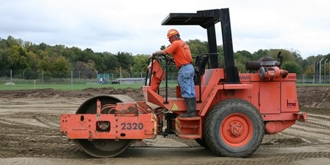Business Lancaster Trenching - Trenching Solutions for Organizations in Lancaster
Business Lancaster Trenching - Trenching Solutions for Organizations in Lancaster
Blog Article
Comprehensive Excavation Methods: Understanding the Basics for Success
In the world of building and civil engineering, the significance of efficient excavation strategies can not be overstated. The mindful preparation, accurate execution, and careful interest to information called for in excavation projects require a comprehensive strategy that incorporates different fundamental aspects. From preliminary dirt evaluation to the application of precaution and routine development surveillance, mastering these core components is crucial for accomplishing success in any kind of excavation endeavor. Nonetheless, truth mastery exists not merely in understanding these principles yet in effortlessly integrating them to navigate the intricacies of excavation tasks with skill.
Understanding Excavation Job Planning

Successful excavation projects are built on the structure of thorough and precise preparation. The initial phase of any type of excavation task is the preparation stage, where crucial decisions are made that can considerably influence the outcome of the job. During this phase, it is important to gather all relevant information concerning the site, including topographical studies, dirt make-up, and any kind of potential risks that may exist. Understanding the task range, timeline, and spending plan restrictions is important for producing a comprehensive excavation plan that makes certain the job's success.
One key element of excavation job planning is the advancement of a comprehensive timeline that lays out the series of turning points, due dates, and tasks. By meticulously thinking about all these aspects during the preparation stage, excavation jobs can be implemented efficiently and efficiently, leading to successful end results - lancaster excavation.
Dirt Evaluation and Website Evaluation
Performing extensive dirt evaluation and site assessment is a crucial step in the preparation stage of any kind of excavation task. Dirt analysis entails establishing the structure, structure, and residential or commercial properties of the soil at the excavation site. This details is vital for recognizing the dirt's bearing ability, dampness material, and potential for erosion, which are crucial elements in determining the excavation methods and devices needed for the project.
Site analysis exceeds dirt analysis and includes a wider assessment of the general website conditions. This examination includes identifying any type of possible dangers, such as below ground utilities, environmental issues, or unstable terrain, that could impact the excavation process. By completely evaluating the site, job managers can establish effective excavation techniques that prioritize safety, efficiency, and environmental management.
Utilizing advanced technologies like ground-penetrating radar, dirt tasting, and drone surveys can improve the accuracy and efficiency of dirt analysis and site examination. Spending time and resources in these preliminary steps can ultimately save time and prevent costly delays or difficulties throughout the excavation procedure.
Tools Choice and Application
Effective excavation tasks rely heavily on calculated devices selection and utilization to make certain optimal efficiency and productivity. Choosing the right equipment for the work is critical in maximizing efficiency and decreasing downtime. Elements such as the type of soil, depth of excavation, and task extent play a substantial duty in identifying one of the Get the facts most suitable devices for the task available.

Along with selecting the appropriate equipment, correct usage is vital to task success. Operators has to be educated to take care of the devices securely and efficiently - excavating ohio. Routine maintenance checks and prompt repair services aid prevent failures and make sure constant performance throughout the task
Precaution and Regulations Compliance
In the world of excavation tasks, focusing on precaution and conformity with laws is critical to guaranteeing a safe and legally sound functional atmosphere. Precaution include a variety of methods, including conducting extensive website assessments, carrying out proper signage and obstacles, and offering adequate security training for all workers associated with the excavation process. Adherence to policies, such as OSHA demands in the United States, ensures that the excavation job meets the required criteria to protect employees, onlookers, and the surrounding setting.

Monitoring Progression and Adjusting Strategies
How can predict managers properly track the improvement of excavation jobs and adjust their approaches as necessary to optimize outcomes? Surveillance development is essential for guaranteeing that excavation jobs remain on track and satisfy due dates. Task managers can make use of numerous devices and strategies to track development, such as daily report card, routine site inspections, and progressed surveillance innovations like drones and GPS tracking systems. By continuously keeping an eye on the project's development, supervisors can determine any prospective hold-ups or issues beforehand and take proactive steps to resolve them.

Verdict
To conclude, grasping the principles of thorough excavation techniques is essential for the success of any type of job. By recognizing project planning, examining dirt and website conditions, selecting suitable devices, abiding by security guidelines, and monitoring progression, task supervisors can ensure a efficient and smooth excavation process. Implementing these techniques will result in successful outcomes and lessen possible threats or troubles during the excavation job.
The first phase of any kind of excavation job is the planning stage, where critical decisions are made that can dramatically impact the end result of the job. Comprehending the project timeline, budget plan, and extent constraints is critical for producing a comprehensive excavation strategy that guarantees the task's success.
Exactly how can project supervisors effectively track the development of excavation projects and adapt their strategies appropriately to maximize results? By closely keeping an eye on development and being prepared to adapt approaches, project supervisors can boost the total success of excavation projects.
By recognizing job preparation, analyzing soil and site conditions, choosing ideal devices, abiding with safety and security regulations, and monitoring progression, task managers can guarantee a smooth and reliable excavation process.
Report this page